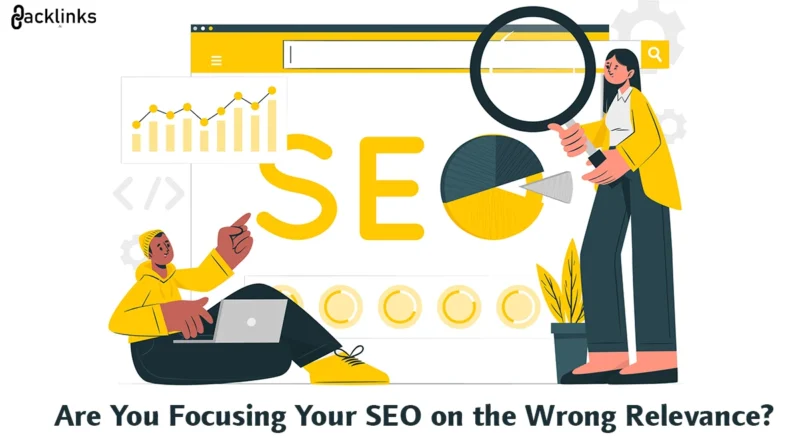Are You Focusing Your SEO on the Wrong Relevance?
Are you frustrated with your SEO efforts not generating the results you desire? It might be time to re-evaluate your focus. In this article, we will explore whether you are targeting the wrong relevance in your SEO strategy.
Understanding the Importance of Relevance in SEO
When it comes to SEO, relevance is key. Simply ranking high for certain keywords doesn’t guarantee that your content is reaching the right audience. It’s essential to align your content with the interests and needs of your target audience.
Relevance in SEO goes beyond just keywords. It involves understanding the intent behind the search queries and providing valuable content that satisfies that intent. By focusing on relevance, you can create a more meaningful and engaging user experience.
Common Mistakes in Relevance-Focused SEO
One of the most common mistakes businesses make is solely focusing on keyword rankings. While it’s important to optimize your content for specific keywords, you shouldn’t neglect other factors that contribute to relevance.
Another mistake is not considering the search intent of your target audience. Understanding why people are searching for certain keywords can help you tailor your content to meet their needs. By addressing their pain points and providing solutions, you can attract the right audience to your website.
The Impact of Irrelevant Keywords on SEO Performance
Using irrelevant keywords in your SEO strategy can have a negative impact on your overall performance. While you may see an increase in traffic, it won’t necessarily result in conversions or engagement.
Irrelevant keywords can lead to a high bounce rate. As visitors quickly realize that your content doesn’t align with their search intent. This can signal to search engines that your website is not providing valuable content, which can, in turn, affect your rankings.
By targeting the right relevance and using keywords that are truly relevant to your audience. You can increase the chances of attracting qualified traffic and improving your SEO performance.
How to Identify and Prioritize Relevant Keywords for Your Website
To identify relevant keywords for your website, it’s important to conduct thorough keyword research. Start by brainstorming a list of topics and themes that are relevant to your business. Use keyword research tools to expand your list and identify high-volume, low-competition keywords.
Consider the search intent behind each keyword. Are people looking for information, products, or solutions? Understanding this will help you align your content with their needs.
Once you have a list of potential keywords, prioritize them based on relevance and search volume. Focus on keywords that have a high search volume and are closely related to your business offerings.
Optimizing On-Page Content for Relevance
Optimizing your on-page content is crucial for achieving relevance in SEO. Start by contain your target keywords naturally into your content. Avoid keyword stuffing, as it can harm your rankings.
Create engaging and informative content that addresses the pain points and questions of your target audience. Use headings, bullet points, and subheadings to make your content more scannable and user-friendly.
Don’t forget to optimize your meta tags, including the meta title and meta description. These elements appear in search engine results and can greatly impact click-through rates.
Is SEO Still Relevant in 2024?
As the digital landscape continues to evolve. It is natural to question the relevance of SEO in the coming years. However, despite the ever-changing algorithms. As well as advancements in technology, SEO remains a vital component of any successful online presence.
Search engines regularly refine their algorithms to provide users with the most relevant and valuable results. This means that SEO practices must adapt and evolve to meet these changing requirements. While the specific tactics and strategies may change. The underlying principles of relevance and user experience will always remain central to SEO.
In 2024 and beyond, SEO will continue to play a pivotal role in driving organic traffic. To building brand visibility, and increasing conversions. By staying up-to-date with the latest trends, understanding user behavior, and categorize relevance in your SEO efforts. You can maintain a competitive edge in the digital landscape.
The Role of Backlinks in Relevance-Focused SEO
Backlinks play a significant role in SEO, especially when it comes to relevance. High-quality backlinks from reliable websites can signal to search engines that your content is valuable and relevant.
Focus on building relationships with industry influencers and thought leaders who can link back to your content. Guest blogging and participating in relevant communities can also help you earn valuable backlinks. Quality is more important than quantity. Aim for backlinks from reputable sources that are relevant to your industry.
Contrary to popular belief, link building is not about quantity but quality. Focus on building relationships with industry influencers, creating valuable content that naturally attracts backlinks, and leveraging guest posting opportunities on reputable websites. Additionally, keep in mind that search engines are regularly refining their algorithms to detect calculating link building practices.
Common Misconceptions About SEO Relevance
In the vast and ever-changing world of SEO, myths and misconceptions abound. It is essential to debunk these misconceptions to ensure that you prioritize the right elements in your SEO strategy.
One common misconception is that SEO relevance is solely dependent on keyword density. Instead, focus on creating high-quality, informative content that caters to the needs and interests of your target audience.
SEO is a long-term investment that requires consistent effort, optimization, and monitoring. It takes time for search engines to recognize and reward the relevance of your website. Patience and perseverance are key to achieving sustainable SEO success.
The Importance of Relevance in SEO
Relevance is the key to success in the realm of SEO. When search engines crawl websites, they aim to deliver the most relevant results to users’ queries.
By optimizing your website to align with the needs and interests of your target audience. You increase the chances of ranking higher in search engine results pages (SERPs). This, in turn, drives organic traffic to your site and enhances your online visibility.
To achieve relevance in SEO. It is crucial to focus on various elements such as keyword research, content creation, and user experience. By understanding the intent behind users’ search queries. You can create valuable, informative, and engaging content that directly addresses their needs.
Additionally, optimizing your website’s technical aspects such as page load speed and mobile responsiveness. It contributes to a positive user experience, further enhancing your SEO relevance
Using User Intent to Improve Relevance in SEO
Understanding user intent is critical for improving relevance in SEO.
Consider the different types of user intent, such as informative, aquatic, or transactional. Create content that aligns with these intents and provides the desired information or solution.
Categorize the Right Elements in SEO
To prioritize the right elements in SEO and improve your relevance. It is crucial to focus on several key strategies. These strategies revolve around understanding your target audience, creating valuable content, optimizing technical aspects, and building reliable backlinks.
Begin by conducting thorough keyword research to identify the search terms and phrases your target audience is using. Incorporate these keywords naturally into your content, ensuring that it remains informative and engaging. Regularly update and optimize your content to reflect the latest trends and user needs.
Optimize your website’s technical aspects, such as page speed, mobile responsiveness, and site structure. A fast-loading website that provides a seamless user experience contributes to your SEO relevance. Additionally, invest in building high-quality backlinks from reputable sources to enhance your authority and visibility.
Strategies to Improve SEO Relevance
To improve your SEO relevance, consider implementing the following strategies:
- Conduct comprehensive keyword research to identify relevant search terms and phrases.
- Create high-quality, informative content that directly addresses the needs of your target audience.
- Optimize your website’s technical aspects, including page speed, mobile responsiveness, and site structure.
- Build reliable backlinks from reputable websites in your industry.
- Regularly monitor and analyze your website’s performance using SEO analytics tools.
- Stay up-to-date with the latest SEO trends and algorithm changes to adapt your strategy accordingly.
By implementing these strategies consistently and focusing on relevance. You can enhance your SEO efforts and drive organic traffic to your website.
The Future of SEO Relevance
As technology continues to advance, the future of SEO relevance holds both challenges and opportunities. With the rise of voice search, artificial intelligence, and mobile-first indexing. SEO professionals must adapt their strategies to meet evolving user behavior and search engine requirements.
In the future, SEO relevance will increasingly rely on understanding user intent and delivering highly personalized experiences. Marketers will need to leverage advanced data analytics and machine learning to gain insights into user behavior and preferences. This will enable them to create highly targeted, relevant content that meets the needs of individual users.
Additionally, the integration of AI will play a significant role in shaping the future of SEO relevance. Search engines will become increasingly adept at understanding context and semantic meaning. To allow them to provide more accurate and relevant search results.
How to Measure SEO Relevance
Measuring SEO relevance is essential to monitor the effectiveness of your efforts and identify areas for improvement. Several key metrics can help you gauge the relevance of your website and optimize your strategy accordingly.
- Organic search traffic: Monitor the amount of organic traffic your website receives from search engine results pages. An increase in organic traffic indicates improved SEO relevance.
- Bounce rate: Analyze the percentage of visitors who leave your website after viewing only one page. A high bounce rate may indicate poor relevance or user experience.
- Time on page: Measure the average time users spend on your website. A longer average time on the page suggests that your content is engaging and relevant to users’ needs.
- Conversion rate: Track the percentage of visitors who complete a desired action on your website. Such as making a purchase or filling out a form. A higher conversion rate indicates improved relevance and user experience.
By monitoring these metrics and using SEO analytics tools. You can gain valuable insights into the relevance of your website. To make data-driven decisions to optimize your SEO strategy.
Refocusing Your SEO Strategy on Relevance
In conclusion, focusing your SEO efforts on relevance is crucial for achieving the desired results. By understanding the importance of relevance, avoiding common mistakes. By optimizing your content for user intent, you can attract the right audience and improve your SEO performance.
Remember to prioritize relevant keywords, optimize your on-page content, and build high-quality backlinks. Track and analyze relevant metrics to ensure the effectiveness of your strategy.
By refocusing your SEO strategy on relevance. You can create a more meaningful and engaging user experience, ultimately driving more traffic and conversions.




